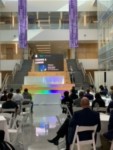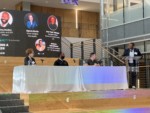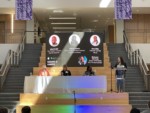
At the end of March, ACT | The App Association co-hosted an event at Louisiana State University (LSU) titled “Coding a Career,” focused on giving students actionable insight around how to turn their computer science skills, interest in the app economy, and general curiosity about entrepreneurship into a career. The event, which included two panel discussions and a keynote address from Veneeth Iyengar, the first executive director for broadband development and connectivity for the state of Louisiana, kicked off with opening remarks by the App Association’s very own executive director, Chelsea Thomas.
 During her remarks, Chelsea expressed her excitement for the future of the app economy and the role platforms and policy can play in that future. As she put it, “without coders, apps are just an idea. Without platforms, your apps don’t have an audience. Without apps, your smartphone is just another device. But with you [the students], what this phone can do next is limitless.”
During her remarks, Chelsea expressed her excitement for the future of the app economy and the role platforms and policy can play in that future. As she put it, “without coders, apps are just an idea. Without platforms, your apps don’t have an audience. Without apps, your smartphone is just another device. But with you [the students], what this phone can do next is limitless.”
Chelsea then introduced the keynote speaker, Veneeth Iyengar. In his role as a champion for broadband deployment across Louisiana, Iyengar is responsible for coordinating efforts between federal, state, and local leaders to eliminate the digital divide in Louisiana by 2029. During his remarks, Iyengar shared the ways the state is actively building resources, including around broadband access, digital literacy, and economic development to support the future of tech entrepreneurship across the state, and expressed his excitement to see what the students would bring to the future of the app economy in the state of Louisiana.

After Iyengar’s remarks, we launched right into our panel discussion. Our first panel titled “Coding a Career” featured panelists from across Louisiana discussing how students could leverage the skills they are learning at LSU into a career in tech, while also highlighting additional skills needed in the app economy and its workforce. Moderated by our state public policy associate, Caleb Williamson, the panel featured:
- Tony Zanders, an award-winning software entrepreneur and library technology executive, currently serving as the founder and CEO of Skilltype, a software platform for information professionals and their teams to analyze, develop, and share expertise.
- Anas “Nash” Mahmoud (Dr. Nash), associate professor of computer science and engineering at LSU teaching CSC 4330, the software systems development class, and whose research interests are in the field of software engineering, with an emphasis on mobile app analytics, human-computer interaction, and static code analysis
- Glynnis Ritchie, senior designer at NewAperio, who got her start in tech as a software developer. Today, she works as a UX designer who specializes in web and mobile design for data-dense applications.
While the panel and Q&A covered a lot of ground, a key theme emerged: companies in the app economy are looking for tech talent who can communicate well in addition to their development and coding skills. Companies need talent who can ask questions, showcase their curiosity, and hone their critical thinking skills. All three panelists noted that knowing coding languages like JavaScript (plus one or two others) is important while adding that a lot of companies will teach you some of those skills on the job; but companies need the talent to come to them with a willingness to learn and the ability to problem solve quickly and efficiently.
 Our second panel titled “Coding a Company” highlighted the things students should think about if their goal for the next stage of their career is building or growing a tech-focused business. Moderated by the App Association’s director of membership, Alex Cooke, the panel featured business owners and supporters from around Louisiana including:
Our second panel titled “Coding a Company” highlighted the things students should think about if their goal for the next stage of their career is building or growing a tech-focused business. Moderated by the App Association’s director of membership, Alex Cooke, the panel featured business owners and supporters from around Louisiana including:
- John Morello, LSU grad and vice president of product at Palo Alto Networks (PANW). And as the second employee and CTO of Twistlock, he helped take the company from zero to more than 400 customers, including 45 percent of the Fortune 100, and their acquisition by PANW for $410 million that helped build a technology hub for the company in the heart of Baton Rouge.
- Geno Miller, founder and CEO of Shtudy, an online hiring marketplace that connects the most inclusive companies in the world with qualified tech talent of color. Geno also serves on the board of directors for multiple entrepreneurial boards, workforce committees, and social impact investment funds, including the Torrey Project, America’s Small Business Development Center, and the Business Association for People of Color in New Hampshire (BAPOC-NH).
- Nadiyah Morris, senior lead at Camelback Network, an arm of Camelback Ventures, a venture and mentorship firm focused on supporting female entrepreneurs and entrepreneurs of color with an emphasis on fair access to funding. Nadiyah is a creator of opportunities for individuals where very few quality options exist. Over her 15-year career, in both the public and nonprofit sectors, she has utilized her experience to build innovative systems in workforce development and youth and human services.
The full discussion highlighted a variety of business concerns like how to think about marketing, financing, staying grounded even when you might have to “embrace the suck” of early-stage careers, and why students should choose Louisiana as the place to start and build their companies and ideas. A critical thread emerged throughout the discussion from all three panelists: don’t let fear stop you. The panelists encouraged students to not let fear stop them from starting to develop their ideas and to start now. They encouraged the students to pick a problem they knew they could solve, to embrace their community, and to fight for what they are worth as an entrepreneur.
The audience of LSU students enhanced the event by being engaged, asking great questions, and taking advantage of the opportunity to network with all the panelists over lunch. With great panelists and engaged audience, we came away with a clear vision of just how bright the future of app economy is, particularly in the Pelican State.